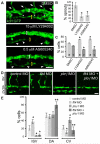Arterial-venous segregation by selective cell sprouting: an alternative mode of blood vessel formation
- PMID: 19815777
- PMCID: PMC2865998
- DOI: 10.1126/science.1178577
Arterial-venous segregation by selective cell sprouting: an alternative mode of blood vessel formation
Abstract
Blood vessels form de novo (vasculogenesis) or upon sprouting of capillaries from preexisting vessels (angiogenesis). With high-resolution imaging of zebrafish vascular development, we uncovered a third mode of blood vessel formation whereby the first embryonic artery and vein, two unconnected blood vessels, arise from a common precursor vessel. The first embryonic vein formed by selective sprouting of progenitor cells from the precursor vessel, followed by vessel segregation. These processes were regulated by the ligand EphrinB2 and its receptor EphB4, which are expressed in arterial-fated and venous-fated progenitors, respectively, and interact to orient the direction of progenitor migration. Thus, directional control of progenitor migration drives arterial-venous segregation and generation of separate parallel vessels from a single precursor vessel, a process essential for vascular development.
Figures




Comment in
-
Development. Aorta's cardinal secret.Science. 2009 Oct 9;326(5950):242-3. doi: 10.1126/science.1181033. Science. 2009. PMID: 19815764 No abstract available.
References
Publication types
MeSH terms
Substances
Grants and funding
LinkOut - more resources
Full Text Sources
Other Literature Sources
Medical
Molecular Biology Databases
Research Materials
Miscellaneous

